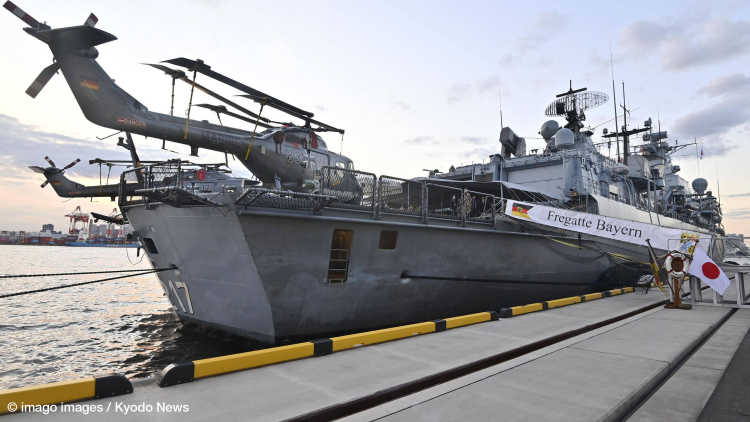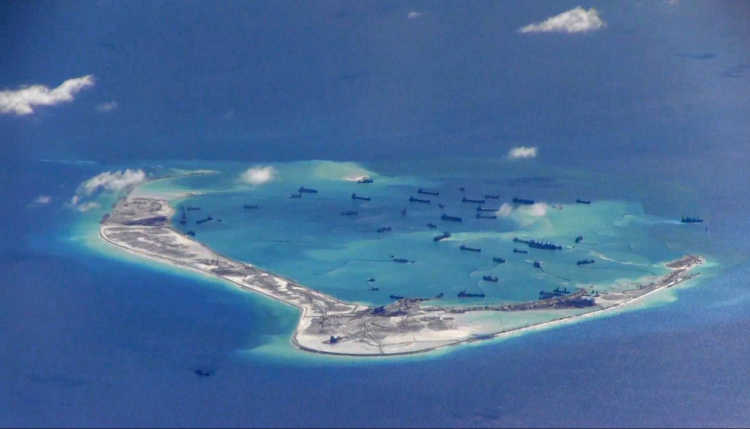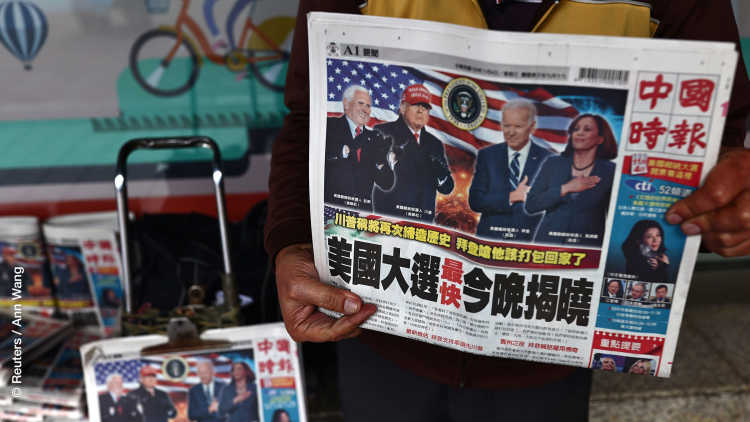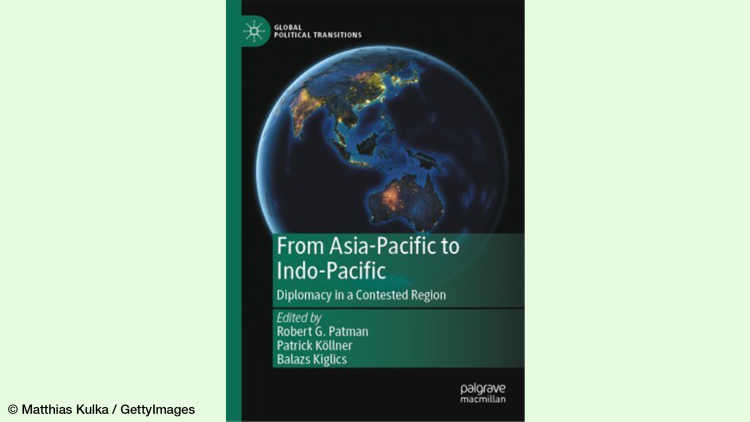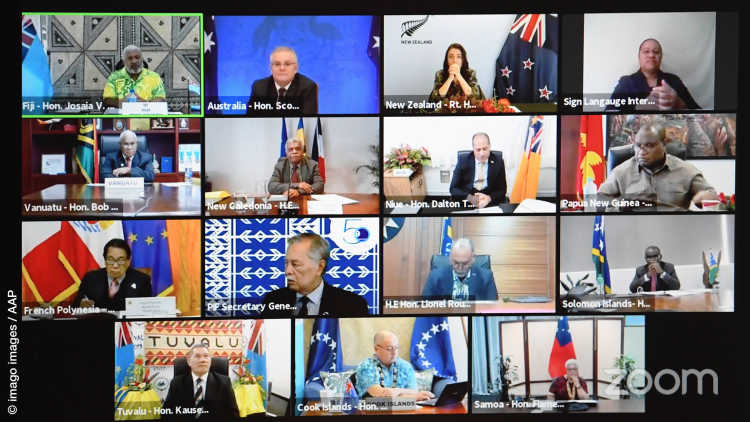- Home
- Publications
- GIGA Focus
- Towards Closer European Union and German Cooperation with South Korea in the Indo-Pacific
GIGA Focus Asia
Towards Closer European Union and German Cooperation with South Korea in the Indo-Pacific
Number 5 | 2022 | ISSN: 1862-359X

In November 2022 South Korean president Yoon Suk-yeol unveiled his country’s new Indo-Pacific strategy, which shares points of convergence with the European Union’s “Strategy for Cooperation in the Indo-Pacific” and Germany’s “Indo-Pacific Policy Guidelines.” As one of the few liberal democracies in the region, an advocate of inclusive multilateralism, and the world’s tenth-largest economy, South Korea is very suited to being a close cooperation partner for the EU and Germany in the Indo-Pacific.
Such cooperation can build on a very solid basis of achievements, especially in the economic realm. This includes a “Free Trade Agreement” in place since 2011. A “Digital Partnership,” also at the EU level, was also signed very recently. And, as a producer of high-tech goods such as semiconductors, South Korea figures as a critical partner in the quest for more resilient supply chains.
The EU, Germany, and South Korea should seek to buttress their oft-emphasised commonalities regarding support for inclusive multilateralism globally with the taking of concrete joint action. Such endeavours should involve the institutions that have been sidelined by the intensification of great-power rivalries – from the G20, to the World Trade Organization, to the United Nations.
The EU, member states like Germany, and South Korea see eye to eye on issues of international security, including most recently the Russian invasion of Ukraine. However, collaboration on strategic matters has yet to reach its full potential. Its central location in East Asia, alliance with the United States, and rich but ambivalent ties with China make South Korea a particularly interesting partner for consultation and cooperation on regional governance, including on security affairs.
Policy Implications
In 2023, 60 years of diplomatic ties between the EU and South Korea and 140 years of such relations between Germany and Korea will be celebrated. Summits and high-level official visits on the occasion of these anniversaries should be used to invigorate coordination and cooperation on questions of global governance and regional security. Dedicated Track 1.5 exchange can support and lend continuity to this official dialogue, too.
The Indo-Pacific as a Space for Enhanced Cooperation with South Korea
In November South Korean president Yoon Suk-yeol unveiled his country’s new Indo-Pacific strategy at the Association of Southeast Asian Nations (ASEAN) Summit in Phnom Penh, Cambodia (Korea Times 2022). South Korea is already an important partner for both the European Union and Germany in the Indo-Pacific. Tellingly, the EU’s “Strategy for Cooperation in the Indo-Pacific” mentions the country no fewer than 14 times – more often, indeed, than other middle powers such as Australia or Indonesia. The Strategy puts particular emphasis on cooperation in the digital domain, including cooperation on data protection and cybersecurity (EU 2021). It also rightly notes the importance of building resilient and diversified supply chains, for which South Korea is potentially a key partner – for example, with respect to semiconductors. This also holds true the other way around. Already today, a global player like ASML, headquartered in Eindhoven, is an important supplier to South Korean semiconductor manufacturers. A strong focus on digital-transformation-related exchange with South Korea figures equally in Germany’s “Indo-Pacific Policy Guidelines” (Federal Foreign Office 2020).
South Korea is in many ways a particularly suitable partner for the EU and Germany when it comes to advancing their respective interests in the Indo-Pacific. First, South Korea is – together with Australia, Japan, New Zealand, and Taiwan – one of the few liberal democracies in that strategic geographic space. The country has represented Asian democracies in many global and regional networks as well as forums. Second, South Korea has been an advocate of inclusive multilateralism, both at the regional and at the global levels, for example with respect to the United Nations and the World Trade Organization. The country is also a member of both the G20 and the Organisation for Economic Co-operation and Development (OECD).
Third, on the back of South Korea’s spectacular economic transformation, the country housed, according to World Bank data, the tenth-largest national economy in 2021 – ahead of the likes of Brazil and Russia. In the Indo-Pacific (excluding the United States), only China, India, and Japan boast larger economies. South Korea’s business conglomerates are at the forefront of a number of global industries. They manufacture high-tech goods such as semiconductors or batteries for electric vehicles. The country’s assets in this regard make South Korea a critical partner for the EU’s and Germany’s quest to build more resilient supply chains. Fourth, its location along the fault lines of regional and international politics, including through its multifaceted relations with China, make South Korea a particularly interesting dialogue partner on matters of regional security.
We explore, hence, both the fruitful but also more challenging areas vis-à-vis the deepening of partnerships here. We start by taking stock of existing cooperative frameworks and ties – many of which relate to the economic realm. In contrast, political and strategic collaboration have yet to reach their full potential. We thus discuss relevant areas for more in-depth exchange and closer collaboration, focusing on the issues of reviving multilateralism globally and of working together in the context of an increasingly fraught regional security order.
Taking Stock: What Has Been Achieved So Far?
Diplomatic relations between the EU and South Korea were first established in July 1963. The fact that South Korea is the only strategic partner with which the EU has concluded three key agreements testifies to the country’s key importance to the latter: A “Free Trade Agreement” (FTA) has been in place since 2011, formally entering into force in 2015. A “Framework Agreement,” covering political dialogue, enhanced security cooperation, as well as collaboration in many other areas has been in force since 2014. Finally, there is a “Crisis Management Participation Agreement,” in force since 2016, which allows for South Korean participation in “Common Security and Defence Policy” activities such as the EU-led Operation Atalanta combatting piracy in the Horn of Africa (Casarini 2021: 1–2). Another “Partnership Agreement” on digital cooperation, along the lines of the one launched by the EU and Japan in May 2022, got recently signed (KBS World 2022).
High-level dialogue formats and working groups exist on topics such as the environment and sustainable fisheries. The EU and South Korea are also in talks about associating the latter with “Horizon Europe,” the EU’s key funding programme for research and innovation. Moreover, South Korea is a pilot partner for “Enhancing Security Cooperation in and with Asia” (ESIWA), which covers shared activities in areas such as counterterrorism, cybersecurity, maritime security, and crisis management. Notably, South Korea has been since 2008 one of the North Atlantic Treaty Organization’s nine “global partners.” Important new steps were taken in this regard in 2022, with Yoon becoming the first South Korean president to participate in a NATO summit and the country’s Belgian embassy also being designated its mission to NATO, too. The summit in June 2022 saw NATO present a new “Strategic Concept” that noted, among other things, the strategic challenges posed by China to Euro-Atlantic security (NATO 2022: 10).
Cooperation between Germany and South Korea is very substantial, too. Diplomatic relations go back nearly 140 years, to 26 November 1883, when Germany and Korea signed a treaty on trade, friendship, and shipping. A much more recent development is the high-level biannual “German–Korean Digital Dialogue”, which got underway in September 2022 (GIZ 2022). Already more advanced is the “German–Korean Energy Partnership” agreed upon in December 2019. It covers cooperation and exchange, with initial working groups in the areas of energy transition, new green energy, and nuclear decommissioning (BMWK n.d.). Both countries are committed to the “Paris Agreement” and are seeking to become greenhouse gas [GHG]-neutral by 2050. Whereas Korea is aiming to reduce its GHG emissions by 40 per cent through 2030 (compared to 2018), Germany is seeking to reduce its own ones by at least 55 per cent within the same time frame (compared to 1990). Both Germany and Korea are also committed to increasing the share of renewables in their respective energy matrices. However, Germany’s ambitious target of a 65 per cent share of renewables in electricity-generation by 2030 contrasts with the Yoon administration’s emphasis on nuclear power as the main source here (Lee 2022).
Cooperation and bilateral exchange are, as noted, especially strong in the economic realm. In 2021, South Korea was the EU’s ninth-largest supplier and export market (third in the Indo-Pacific behind China and Japan), with bilateral trade amounting to over EUR 107 billion per annum according to Eurostat. Viewed the other way around, the EU ranks as South Korea’s second-largest supplier and third-largest export market. Bilateral trade in services has also substantially increased, hovering at around the EUR 20 billion per annum mark in recent years (GTAI 2022). In terms of foreign direct investment (FDI), the EU has been the largest source thereof in South Korea: reaching EUR 44 billion in 2019, or 37 per cent of total FDI in the latter. Vice versa, South Korean FDI in the EU amounted to EUR 29 billion euros by 2019, an increase of over 150 per cent from 2010 (European Commission 2021). In the years to come, South Korean arms exports to the EU will add a political dimension to the two sides’ burgeoning bilateral trade. In 2022, Seoul and Warsaw signed a major deal on the delivery of battle tanks, howitzers, and light-combat aircraft to Poland (Pietrewicz 2022).
Germany is South Korea’s most important economic partner within the EU, meanwhile. The volume of bilateral trade between the two was worth more than EUR 31 billion in 2021 – with Germany registering here a surplus of EUR 6 billion, exporting in great quantity cars, machinery, and chemicals to South Korea. German FDI in South Korea amounted to close to EUR 14 billion euros in 2020; the latter’s own business enterprises had, meanwhile, invested more than EUR 6 billion in the former by that same year (GTAI 2022). Germany favours enhancing the existing FTA at the EU level to address issues such as supply-chain resilience, digital trade, and decarbonisation.
Reviving Multilateralism Globally
The fragmentation of global governance is now a commonplace observation – at a time when truly universal challenges, such as climate change and pandemics, demand inclusive and internationally coordinated action. As export-oriented, trading nations with limited capacities to project hard power globally, Germany and South Korea have been among the world’s main beneficiaries of economic globalisation and binding international rules. Thus, the two countries have a shared interest in strong and inclusive multilateral institutions. Notably, this fundamental aspiration is shared by political majorities in both countries and transcends party divides. For decades, South Korea has been a proactive member of established multilateral institutions ranging from the WTO to the various UN agencies. The world’s tenth-largest economy is also among the top-ten financial contributors to the UN, while South Korean Ban Ki-moon served two terms as the latter’s secretary-general (from 2007 to 2016). Moreover, South Korea is a member of the G20 – a forum that originally was designed to accommodate emerging powers in global economic governance but that has over time become gridlocked itself by great-power rivalries. As host to the fifth G20 summit in 2010, South Korea was widely praised for raising developing countries’ concerns in a forum that otherwise excludes them.
Moreover, whereas both South Korea and Germany rely on US security guarantees, the two feel uneasy – a position that also appears to be consensual among a majority of voters in both – about the emerging geopolitical contest between the North American country and China. In trade, for instance, South Korea is part of the “Regional Comprehensive Economic Partnership” (RCEP), a regional FTA including China as well as most East and Southeast Asian countries. However, Seoul this year also applied for membership in the “Comprehensive and Progressive Agreement for Trans-Pacific Partnership” (CPTPP), a more ambitious trading bloc addressing labour, environmental, and other regulations that includes Australia, Canada, Japan, plus several Latin American as well as Southeast Asian countries but not China. And, as one of the US’s closest allies, South Korea is a founding member of the “Indo-Pacific Economic Framework for Prosperity” (IPEF), a yet-to-be-specified regulatory framework put forth by the Joe Biden administration in 2022. IPEF is meant to “reinstate U.S. ‘economic leadership’ in the […] region and enable the United States ‘to [re]write the rules of the road’ for the Indo-Pacific” (Forough 2022: n.p.). Clearly, IPEF forms a crucial part of US attempts to limit Chinese influence in the Indo-Pacific.
Wary of its precarious position in between major powers, South Korea seeks to engage its most important trading partner, China, as well as its key security provider, the US, simultaneously. Herein, South Korea faces challenges not unlike Germany’s own ones. Most visibly, both countries attracted the Donald Trump administration’s ire over allegedly free-riding in security as well as trade. Likewise, both countries have a lot to lose economically from an escalation of tensions with China. Thus, South Korea is among Berlin’s most obvious partners when it comes to reviving multilateralism globally.
In fact, global multilateralism – namely, meaningful institutions that include both competing great powers and smaller and developing countries – has been under attack on two fronts in recent years. On the one hand, populist nationalists across the globe have nurtured mistrust towards international institutions and the supposedly “globalist” elites running them. On the other, significant tensions – whether between the US and China, Western nations and Russia, or between China and India – have hampered the operation of the World Health Organization (WHO), the UN Security Council, and other UN agencies besides. Rather than the G20, it is the G7 that has experienced a revival in the wake of the COVID-19 crisis and the Russian attack on Ukraine. Elsewhere, the world’s universal trade regime, the WTO, has been gradually replaced by regional, bilateral, and inter-regional agreements, depriving smaller economies of much of their negotiating power.
Germany and South Korea not only share a fundamental interest in reviving inclusive multilateralism globally. With their credentials as multilateralists and in combination with other potential partners from across the globe, the two countries can also make a genuine difference to the course of events here – including by reminding the US of its own history as a champion of inclusive global institutions. Rather than simply declaring their support for multilateralism, concrete, coordinated action within existing institutions is warranted. And, rather than seeking alignment within exclusive alliances such as NATO, the EU and Germany should cultivate cooperation with South Korea within inclusive institutions.
This could be achieved, for instance, by seriously attempting to reinvigorate the G20 – as the only existing forum wherein all the world’s competing major powers meet, however unlikely finding immediate agreements over Taiwan, Ukraine, or other contentious issues may be. In fact, in the absence of UN reform, turning the G20 into a forum designed to alleviate great-power tensions would be a worthy goal. Moreover, cooperation between South Korea, the EU, and Germany could involve concerted action to safeguard the WTO system, including its mechanism for the resolution of trade disputes – being dear to member states that otherwise cannot challenge major powers’ trade policies. Upholding the UN and key bodies such as the WHO is another avenue for concerted action likely to garner support among a majority of countries worldwide.
South Korea as a Window on East Asia’s Regional Order
Given the emergence of the Indo-Pacific as a strategic space, questions of international security have become increasingly salient in Europe–South Korea relations, too. While Germany and South Korea had for many years been focused on the challenges of national reunification, in recent times security-related exchange has broadened and intensified instead. Most notably, as part of Germany’s stepped-up engagement in the region, the frigate Bayern made a port call in Busan in December 2021, while a heavy-transport aircraft from the Luftwaffe visited South Korea in September 2022. The political signalling accompanying these visits showed that German and Korean Indo-Pacific policies aim at mitigating the instability caused by the intensifying Sino–US contest for primacy in the region. Both governments also seek to counter China’s attempts at (re)shaping the norms and institutions of the international order.
Yet, to fully grasp how the nature of the regional security order in East Asia is changing, the European perspective must also take the views of actors other than the early adopters of its Indo-Pacific policies into serious consideration, too. Developments in regional security cannot be understood without looking at how powerful actors’ interests intersect and collide. Hence, intensified dialogue with South Korea on geopolitical developments can lead to clearer and more accurate assessments of changes in the regional and international orders. In East Asia, unlike in Europe, Cold War-era divisions and conflicts never came to an end. The disintegration of the Soviet Union in 1991 brought very limited change to a divided Korean Peninsula. South Korean leaders have not only grappled with a North Korea arming itself with nuclear weapons. Despite becoming a global economic powerhouse and undertaking serious attempts at overcoming the inter-Korean confrontation, South Korean policymakers are now also facing the spectre of their country, once again, becoming an object of great-power politics.
Whereas Germany is part of the European response to Russian aggression, and increasingly also of the concerted pushback against China’s expanding reach, South Korea remains trapped on the frontline of heightening tensions between the US and Japan vis-à-vis both North Korea and China. These tensions complicate inter-Korean relations significantly. And they perpetuate old divisions within South Korean society and politics, while putting additional strain on the country’s economic prosperity. Examples are China’s economic retaliation after the South Korean government agreed, in late 2016, to the stationing on its soil of a US Terminal High Altitude Area Defense (THAAD) missile system, and the discriminatory fallout of the Trump and Biden administrations’ industrial policies for onshoring manufacturing to the US and cutting China out from electric-vehicle and semiconductor supply chains.
Thus, South Korean policymakers have, until very recently, been reluctant to sign up to the strategic construct of “the Indo-Pacific” and the often ambiguously employed concept of a “rules-based order” associated with it. As seen from within the East Asian region, rules-based order carries a number of – not necessarily compatible – meanings. Although used as shorthand for the multilateral institutions of the UN system and other universal international legal treaties in official policy papers, rules-based order, in practice, often refers to the security partnerships that the US and its Pacific allies established in the 1950s to contain the Soviet Union, North Korea, North Vietnam, and China. Therefore, the reliance on military deterrence for safeguarding particular – often static and monolithic – interpretations of this order, rather than for deterring concrete aggressive manoeuvres such as those in the Taiwan Strait, raises the question of where continuously escalating tensions will lead to. Even the conservative Yoon administration, in power since spring 2022 and positively inclined towards the idea of the Indo-Pacific, has been unable to escape these predicaments. Therefore, it has so far refrained from making drastic changes to South Korea’s foreign policy orientation.
Yet, just as conservative Japanese politicians have promoted the strategic construct of “the Indo-Pacific” to alleviate the contradiction between their economic dependence on an increasingly assertive China and security-political reliance on a more volatile US, South Korean policymakers should also use this framing to expand their own room for manoeuvre. By following ASEAN, the EU, and Germany in embracing an inclusive perspective on the Indo-Pacific, the South Korean leadership might be able to partially alleviate some of the predicaments it is facing. Certainly, Seoul adopting a proactive approach would prevent it from being ignored in the geopolitical contest between China, Japan, and the US, all of whom seek to mobilise European actors in the pursuit of their respective national interests.
Even though strong military cooperation across the Pacific remains of great importance, simply choosing the US side in the intensifying rivalry entails significant risks for South Korea. This is not only because of its economic dependency on China but also because South Korean interests are not identical to those of the US and Japan. This became apparent when former president Moon Jae-in, in early 2018, felt compelled to intervene in discussions among Trump administration officials who were seriously contemplating retaliation against North Korean sabre-rattling via a “bloody nose” pre-emptive military strike (Moon 2019). The security policy establishments in Washington and Tokyo also revealed such a perception gap to exist when they remained very critical of the Moon administration’s popular agenda for improving inter-Korean relations. They were wary of South Korea’s efforts to strengthen confidence-building measures with the Kim Jong-un regime and its plans to start discussions about how to replace the armistice with a peace treaty. Thus, to safeguard South Korean national interests, Seoul is well-advised to engage its European counterparts even more. The renewed European interest in the region means that it has become necessary for South Korean policymakers, irrespective of their affiliation with conservative or progressive party-political agendas, to actively communicate their views on how to best manage relations with China, Japan, North Korea, and the US in ways that prevent the further escalation of tensions.
Conversely, for the EU and Germany their deeper security cooperation with South Korea promises to yield a better understanding of regional political developments and is therefore crucial for the effective implementation of their respective Indo-Pacific policies. Having looked at East Asia through a commercial lens for decades, European policymakers and analysts only recently came to pay attention to the politics of the region. This awakening emerged after an arbitration tribunal in 2016 ruled against expansive Chinese claims in the South China Sea, after the latter regime’s large-scale incarceration of ethnic minorities as well as its repression of political dissent in Hong Kong came to light, and when tensions over the status of Taiwan reached another high point in summer 2022. Then, particularly Taiwanese and Japanese leaders pointed to the danger that the Chinese government might embark on the same aggressive course as Russia – “Ukraine may be East Asia tomorrow” (Reuters 2022). The world seems to have entered a new phase of bipolar confrontation between rule-breaking autocracies on the one side and rule-abiding democracies on the other.
Yet, the big question is not only how to respond in ways that deter aggressive moves across the 38th parallel separating North and South Korea, and across the Taiwan Strait, without provoking North Korean and Chinese overreactions – and thereby the very outcomes that were meant to be avoided. If the region is to be kept peaceful, and if stability is more than a state of Cold War-like mutual deterrence between the US and China, the more difficult question is how the involved actors can work towards a new, institutionalised, and settled equilibrium. Therefore, they must gain a clearer understanding about what rules-based order has been in existence over the last few decades and in what ways it needs to be adjusted to stabilise the region once again.
These questions can only be answered if European and South Korean policymakers look beyond those actors who are motivated by the desire to revive their past imperial greatness. If European leaders seek to strengthen the rules-based order, as codified in the “UN Charter,” the “UN Convention on the Law of the Sea,” as well as human rights and non-proliferation/disarmament treaties, the privileging of militarily powerful states appears contradictory. In addition to South Korea, European policymakers should also reach out to other states – especially Southeast Asian governments. Although they carry less weight on the international stage individually, these countries share a common understanding of, and appreciation for, the UN-centred international order. This is because foreign policy elites in these smaller states remember well the violence that comes with bipolar confrontation.
Towards Closer Collaboration on Global Governance and Security Issues
South Korea is a very suitable partner country to the EU and Germany vis-à-vis their interest in a prosperous and stable Indo-Pacific and strengthening crucial institutions of global governance. Cooperation should go beyond their already well-developed bilateral frameworks within the economic realm. Great potential lies in the respective sides’ closer cooperation on strengthening institutions of global governance such as the UN, its affiliated organisations, and complementary formats like the G20. Given that the rivalry between China and the US has been heightening fears about armed clashes on the Korean Peninsula and across the Taiwan Strait, while the Russian attack on Ukraine shattered the regional order in Europe, policymakers in the EU, Germany, and South Korea should also deepen their consultation on questions of security politics. Timely opportunities to deepen dialogue on important but also very challenging strategic and indeed global issues are offered by EU–South Korea summits and the planned visit of President Yoon to Germany to celebrate the anniversaries of diplomatic ties. Track 1.5 exchange involving European and Korean practitioners and experts can play a useful role in supporting dialogue formats at the official level, too.
Note
This briefing paper emanates from the project “Engaging the Indo-Pacific: German and Korean Perspectives on Regional Cooperation,” funded by the Korea Foundation.
Footnotes
References
BMWK (Federal Ministry for Economic Affairs and Climate Action) (n.d.), The Korean-German Energy Partnership, accessed 10 October 2022.
Casarini, Nicola (2021), Introduction, in: Nicola Casarini (ed.), EU-Korea Security Relations, London and New York: Routledge, 1–13.
EU (European Commission and High Representative of the Union for Foreign Affairs and Security Policy) (2021), Joint Communication to the European Parliament and the Council, The EU Strategy for Cooperation in the Indo-Pacific, Brussels, 16 September, JOIN(2021) 24 final, accessed 10 October 2022.
European Commission (2021), EU-Republic of Korea Trade Grows Twice as Fast Under Trade Agreement, 1 July, accessed 26 October 2022.
Federal Foreign Office (2020), Policy Guidelines for the Indo-Pacific, accessed 26 October 2022.
Forough, Mohammadbagher (2022), America’s Pivot to Asia 2.0: The Indo-Pacific Economic Framework, in: The Diplomat, 26 May, accessed 26 October 2022.
GIZ (Deutsche Gesellschaft für Internationale Zusammenarbeit) (2022), Erster Deutsch-Koreanischer Digitaldialog: Unterzeichnung einer Gemeinsamen Absichtserklärung, Internationale Digitaldialoge, 9 September, accessed 10 October 2022.
GTAI (Germany Trade & Investment) (2022), Wirtschaftsdaten kompakt: Südkorea, May, accessed 10 October 2022.
KBS World (2022), S. Korea, EU Sign Digital Partnership Agreement, 29 November, accessed 30 November 2022.
Korea Times (2022), Yoon Unveils Strategy for Free, Peaceful, Prosperous Indo-Pacific, 11 November, accessed 14 November 2022.
Lee, Susan (2022), Seoul Officially Includes Nuclear Energy in Green Taxonomy, in: Pulse, 20 September, accessed 10 October 2022.
Moon, Chung-in (2019), President Moon Jae-in and the Korea Peace Initiative, in: Global Asia, 14, 2, accessed 27 October 2022.
NATO (2022), NATO 2022 Strategic Concept, accessed 10 October 2022.
Pietrewicz, Oskar (2022), South Korea’s Defense Industry Looks to Europe with Major Polish Arms Deal, in: Korea Pro, 1 September, accessed 10 October 2022.
Reuters (2022), Ukraine Plight Could Be Replicated in East Asia, Japan’s Kishida Warns, 7 May, accessed 27 October 2022.
General Editor GIGA Focus
Editor GIGA Focus Asia
Editorial Department GIGA Focus Asia
Regional Institutes
Research Programmes
How to cite this article
Köllner, Patrick, Johannes Plagemann, and Christian Wirth (2022), Towards Closer European Union and German Cooperation with South Korea in the Indo-Pacific, GIGA Focus Asia, 5, Hamburg: German Institute for Global and Area Studies (GIGA), https://doi.org/10.57671/gfas-22052
Imprint
The GIGA Focus is an Open Access publication and can be read on the Internet and downloaded free of charge at www.giga-hamburg.de/en/publications/giga-focus. According to the conditions of the Creative-Commons license Attribution-No Derivative Works 3.0, this publication may be freely duplicated, circulated, and made accessible to the public. The particular conditions include the correct indication of the initial publication as GIGA Focus and no changes in or abbreviation of texts.
The German Institute for Global and Area Studies (GIGA) – Leibniz-Institut für Globale und Regionale Studien in Hamburg publishes the Focus series on Africa, Asia, Latin America, the Middle East and global issues. The GIGA Focus is edited and published by the GIGA. The views and opinions expressed are solely those of the authors and do not necessarily reflect those of the institute. Authors alone are responsible for the content of their articles. GIGA and the authors cannot be held liable for any errors and omissions, or for any consequences arising from the use of the information provided.







